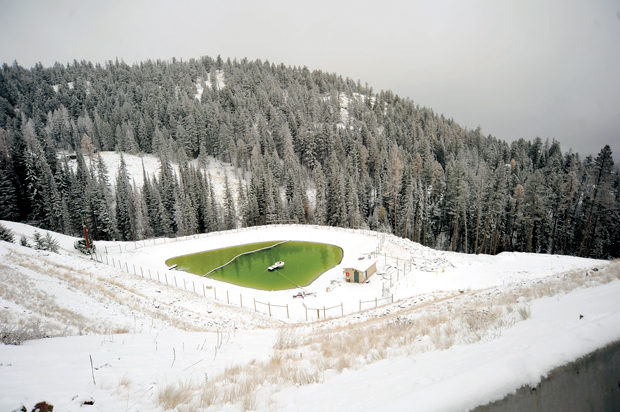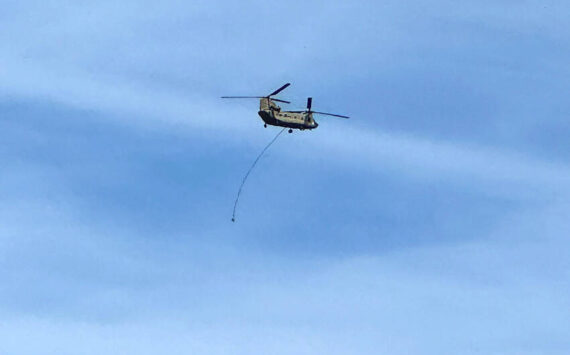
Groundwater and snowmelt in settling pond where water was collected prior to treatment at the Buckhorn Mine near Chesaw. Photo taken during a tour of the mine before it was closed and went into the reclamation phase.
Crown responds that permit is ‘unreasonable’
OLYMPIA – The Washington State Court of Appeals, Division III, has rejected Crown Resources’ appeal of the NPDES (National Pollutant Discharge Elimination System) permit that the Washington State Department of Ecology issued for the Buckhorn Mine.
The opinion of the appeals court affirms the Pollution Control Hearings Board’s (PCHB’s) July 30, 2015 findings and conclusions affirming the permit. The Ferry County Superior Court also denied Crown Resources’ petition for review and affirmed the Board’s decision in all respects, in March 2017.
Today’s ruling affirms that the water surrounding the Buckhorn Mine must be left almost as clean as it was before the mine was developed.
“The mine was always required to contain its pollutants,” said Sarah Kliegman, co-Executive Director of the Okanogan Highlands Alliance.
The Buckhorn Mine, however, continues to discharge pollutants into the environment in violation of their discharge permit.
“Now that the permit is once again affirmed, we expect the Department of Ecology to direct Crown to cease discharging pollutants into the environment,” said Kliegman.
The appeals court reviewed the nearly 10,000-page record and hearing arguments from Crown, Ecology, and the Okanogan Highlands Alliance, who was an intervener in the case. The appeals court reviewed the Board’s decision to ensure the Board did not make a prejudicial error of law, to confirm it relied on substantial evidence, and to evaluate whether its decision was arbitrary or capricious. The appeals court found that Crown had failed to meet its burden to prove the Board erred in sustaining Ecology’s issuance of the permit.
In his brief to the court, OHA’s attorney, Paul Kampmeier, said, “Crown does not challenge the Board’s legal conclusions regarding the validity of the permit; instead, it argues the Board improperly weighed or ignored Crown’s evidence in making its findings of fact… Crown argued to the wrong standard of review when it contends the evidence supporting its position requires reversal of the Board’s decision. Crown did not demonstrate that the findings it challenges do not have a basis in the record.”
The NPDES permit clarifies the farthest extent from the mine that contaminants are allowed to spread. It also affirms that the water quality criteria (beyond this farthest extent) is set at the background level as it was before the mine was constructed.
The Okanogan Highlands Alliance is a non-profit organization that works to educate the public about watershed issues, including the environmental threats of large-scale mining. Paul Kampmeier, of Kampmeier & Knutsen PLLC, represented OHA before the court of appeals and Ferry County Superior Court.
Crown Resources’ response:
From Jacquelyn J Nutt, Environmental Manager, “Crown Resources continues to maintain that the NPDES permit is unreasonable, based on flawed assumptions and did not properly consider the natural background levels nor previously permitted mine activities. The permit also set an arbitrary and artificial ‘capture zone’ boundary which, among other things, does not account for facilities that fall outside this “capture zone” that were designed and installed to manage water. As a result, the permit standards are in many cases unattainable and the unfavorable decision from the Court of Appeals does not change that.
“While we are disappointed with the court decision and are reviewing our appeal options, we will continue to undertake our reclamation activities at the now-closed Buckhorn Mine in an environmentally responsible manner. We will also continue to work with the Department of Ecology on a renewal of the permit that is protective of the environment and provides for application of all known, available and reasonable methods of pollution prevention, control and treatment.”






